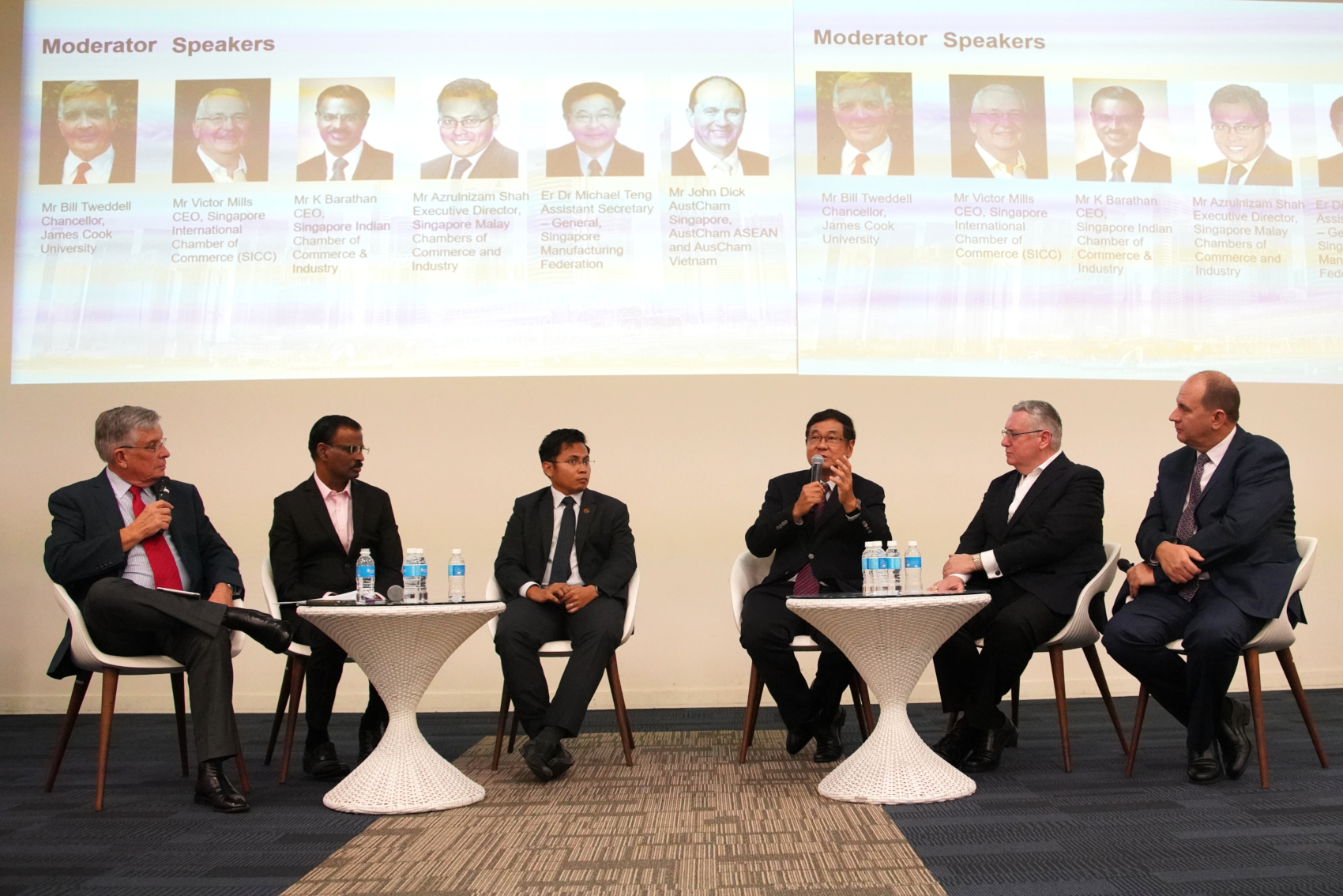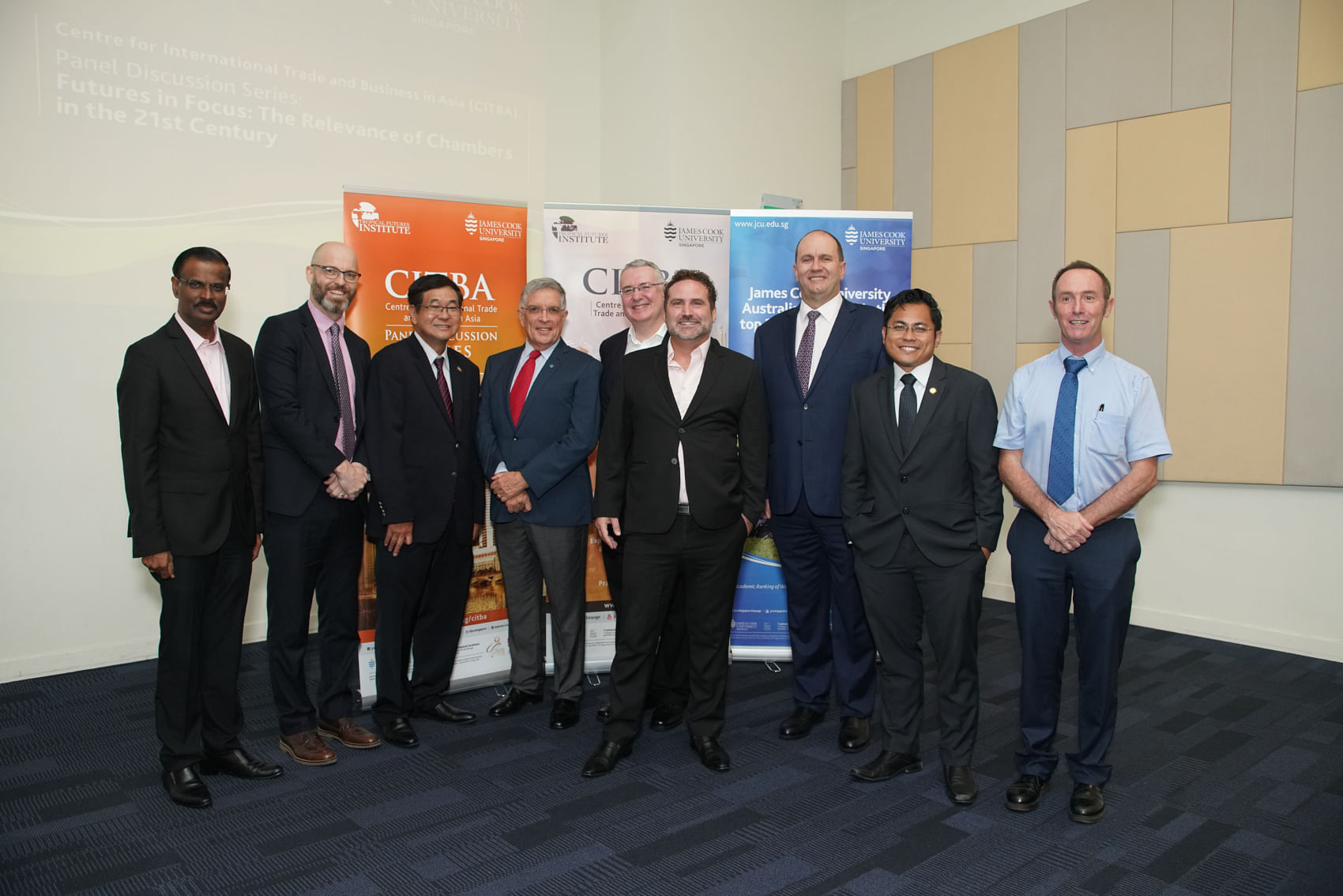BRANDED CONTENT
Tough questions for tough times
The Centre for International Trade and Business in Asia at the Singapore campus of James Cook University discusses the role of the chamber of commerce today
Sign up now: Get tips on how to help your child succeed

Speakers at the "Futures in Focus: The relevance of Chambers in the 21st Century" event, hosted by the Centre for International Trade and Business in Asia at the Singapore campus of James Cook University. From left: Mr Bill Tweddell, Mr K Barathan, Mr Azrulnizam Shah, Dr Michael Teng, Mr Victor Mills and Mr John Dick. PHOTO: JAMES COOK UNIVERSITY
Is there still a point to the chambers of commerce today?
Chambers of commerce have been a fixture within the commercial sector for more than a century. Traditionally, they served as a platform for businesses to interact with each other, regardless of the sector each of them belongs to. In chambers of commerce, small to medium enterprises stand on equal footing with large multinational corporations.
Chambers of commerce also serve as a place for businesses to engage in B2B marketing, facilitating new opportunities for inter-business collaboration.
But these institutions are now precariously perched given the rise of the Internet. Today, online networking platforms like LinkedIn and others of similar ilk can do the chamber of commerce's job just as well - and arguably, more efficiently. Fledgling businesses seeking advice from senior chamber members can just as easily take their queries online.
So has technology indeed made the chamber of commerce obsolete?
This is precisely what the Centre for International Trade and Business in Asia (CITBA) at the Singapore campus of James Cook University tackled in its latest panel discussion.
Entitled "Futures in focus: The relevance of Chambers in the 21st Century", the panel had several key business figures from all over the region weigh in on this issue.
These included Mr Azrulnizam Shah, Executive Director of the Singapore Malay Chamber of Commerce and Industry; Mr Victor Mills, Chief Executive of the Singapore International Chamber of Commerce; Mr K Barathan, Chief Executive of the Singapore Indian Chamber of Commerce and Industry; and Dr Michael Teng, Assistant Secretary-General of the Singapore Manufacturing Federation.
Representing AustCham Singapore was Honorary Secretary, Mr John Dick.
The discussion was moderated by Mr Bill Tweddell, Chancellor of James Cook University.
Together, they addressed transformational market challenges, discussed evolutionary technological changes, and plotted the future trajectory of Singaporean chambers of commerce to ensure continued economic sustainability and relevancy.

Each member highlighted key measures for the survival of Singaporean chambers of commerce, such as the diversification of revenue streams, preservation of membership numbers, discovery of new profit centres and offering customised membership services like training and education.
Dr Teng shared: "At the Singapore Manufacturing Federation, only a small percentage of revenue is from subscriptions."
"The federation has diversified its offerings and has been providing customised services such as consultancy and training to our members," he continued.
"Chambers should be more than just a receptacle for networking," Mr Azrulnizam commented, on adapting to the new realities that chambers face.
"At SMCCI, we provide pathways, develop platforms and facilitate partnerships between our members. For example, the SMCCI has a chapter called the Young Entrepreneurs Network, which caters to millennials and young business owners."
Mr Azrulnizam also added that this network does not exist in isolation. "The SMCCI has created it as an articulated platform, allowing for regular engagement between members of this network and its regular members."
The discussion culminated in the publication of a white paper containing policy recommendations for Singaporean chambers of commerce, and how to respond to technological disruption.
"The panel provided a series of interesting insights into how chambers [of commerce] can remain relevant and provide value to their members in the era of digital marketing," said Dr Jacob Wood, Director of CITBA and Senior Lecturer in Business at the Singapore campus of James Cook University.
"As society evolves and with it the business environment, chambers just like universities must continuously challenge themselves to reassert their relevance," said Professor Chris Rudd OBE, Deputy Vice Chancellor and Head of Campus, Singapore, in his closing remarks.
"Innovation in the way chambers educate and engage with their target audience is critical. I am delighted that CITBA has created this unique platform which brings such high quality audiences to our campus to foster intellectual debate and the exchange of new ideas," he concluded.
"James Cook University is committed to staying relevant to the needs of the people of the Tropics and to being a respected provider of talent training and new ideas that improve lives and sustain our fragile environment."
Correction: A previous version of this article referred to Dr Michael Teng as Deputy Secretary-General of the Singapore Manufacturing Federation. He is actually the Assistant Secretary-General of the Singapore Manufacturing Federation. We are sorry for the error.
The Centre for International Trade and Business in Asia (CITBA) aims to bring together scholars and practitioners in the areas of international trade, economic policy, and business in Asia. Learn more about the business research capabilities at the Singapore campus of James Cook University.


